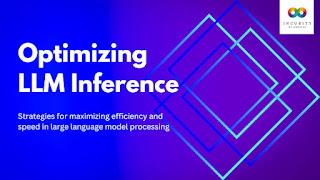
Speeding Up LLM Output With Speculative Decoding
At the heart of speculative decoding lies a two‐model dynamic: a smaller“draft” model generates several tokens ahead of time, and the larger“target” model validates them in parallel. If the proposed tokens match what the target model would have produced, they are accepted wholesale; if not, adjustments follow. This delivers up to two‐ to three‐fold speed improvements, as shown with models such as T5‐XXL, without altering the output distribution. Google Research has affirmed that speculative decoding enables faster, cost‐efficient LLM inference without sacrificing fidelity.
Recent investigations have deepened understanding of what affects speculative decoding's efficiency. A study involving over 350 experimental runs on LLaMA‐65B and OPT‐66B demonstrated that throughput gains depend largely on draft model latency-its language modelling strength alone plays a more modest role. Broader surveys have explored alternative drafting and verification strategies, helping to delineate best practices for selecting and configuring draft models.
Advances continue to emerge. Notably, new draft model architectures have achieved a staggering 111 percent higher throughput compared to earlier models, while maintaining compatibility across various LLaMA versions and supervised fine‐tuned systems.
As with any innovation, speculative decoding brings challenges. A groundbreaking study has identified privacy vulnerabilities: timing and data patterns from speculative mechanisms may be exploited to infer sensitive user inputs or proprietary system details with over 90 percent accuracy under certain techniques. Mitigation strategies, such as token aggregation or network padding, are being developed to protect confidentiality.
See also Markets Shake as Nvidia's China Outlook Clouds Stellar Earnings Notice an issue? Arabian Post strives to deliver the most accurate and reliable information to its readers. If you believe you have identified an error or inconsistency in this article, please don't hesitate to contact our editorial team at editor[at]thearabianpost[dot]com . We are committed to promptly addressing any concerns and ensuring the highest level of journalistic integrity. Legal Disclaimer:
MENAFN provides the
information “as is” without warranty of any kind. We do not accept
any responsibility or liability for the accuracy, content, images,
videos, licenses, completeness, legality, or reliability of the information
contained in this article. If you have any complaints or copyright
issues related to this article, kindly contact the provider above.


















Comments
No comment